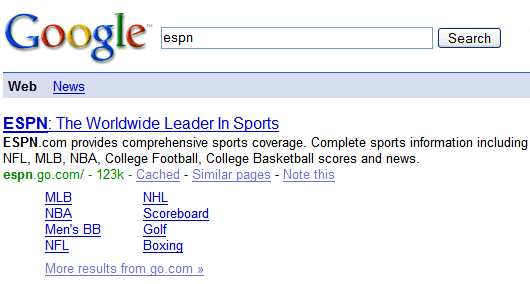
Many people use Google to find a website they already know, so they type things like [Yahoo], [BMW] or [weather.com]. But some people search for [Yahoo], even though the real intention was to go to Yahoo Mail. To save a click and some precious time, Google introduced sitelinks: a list of links to popular places from a site. "Our systems analyze the link structure of your site to find shortcuts that will save users time and allow them to quickly find the information they're looking for," explains Google. It's a search refinement at the site level.
Now Google shows up to 8 sitelinks instead of 4 and allows you to block the ones you don't like, but only for your sites. While Google displays only a small number of links, it actually generates a site map and sorts it according to a quality factor. A patent filled in 2005 included some examples of factors: the number of page views, the amount of time spent on a page as determined from Google Toolbar's data, but it's not clear if Google actually sorts the links this way or it only uses data from Google searches. Google Analytics and Google Web History are other two possible sources of information.
Log data storage may include information indicating whether a typical client scrolled through the web pages identified in log data storage or linked out of the web pages without scrolling. In still further alternatives, or in addition to the information described above, log data storage may store information retrieval scores associated with each web page identified in log data storage, where the information retrieval score indicates how closely a particular search query matches information on the web page. In still other alternatives or in addition to the information described above, log data storage may store information identifying the likelihood that a typical client will make a purchase associated with an item displayed on a web page. The likelihood that a purchase will be made may be provided by an entity (e.g., a company) associated with the particular web page or may be provided from user logs.
It will be interesting if Google decides to expose the automatically generated site maps through Google Toolbar or other interface and standardize the way you navigate the web.

Hmm, still can't see 8 links anywhere, only 4. Must be rolled out still...
ReplyDeleteAny idea as to whether or not the Google Toolbar knows if you've switched tabs when considering the amount of time spent on a page?
ReplyDeleteFor example, if I open up website.com and then go and read inter.net for a half an hour in another tab, does it still think I'm looking at a page on website.com?
Well, Google Toolbar only sends the URLs if you enable the PageRank feature or the Web History. The patent quoted in the post mentioned about the toolbar as a source of traffic data, but that doesn't mean Google uses it.
ReplyDeleteTo answer your question, it's easy to see that Google Toolbar only sends the URL when you load a new page and no other information. Use something Live HTTP Headers for Firefox to check it out.